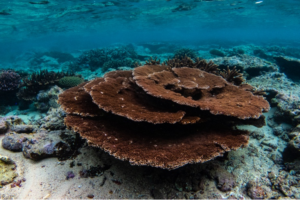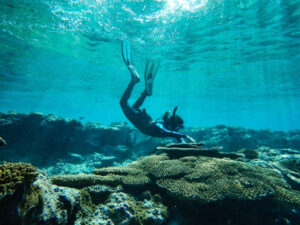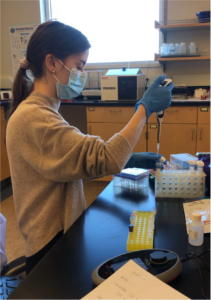"Effects of Land-Based Sources of Pollution on Coral Thermotolerance"
A Thesis Defense by Melissa Naugle
MLML Live-Stream | July 23, 2021 at 10 am
Melissa Naugle graduated from University of Maryland, College Park in 2016 with a B.S. in Environmental Science and Policy. During her time at UMD, she had the opportunity to participate in a coral monitoring internship in Thailand where she learned to SCUBA dive. After that experience, Melissa knew she wanted to pursue marine science research. After graduating, she began a research position at Georgetown University, where she studied how disturbance affects the community ecology and population genetics of salt marsh arthropods. Melissa began her Master’s at California State University, Monterey Bay and Moss Landing Marine Labs in 2018 in the Logan Lab and the Invertebrate Ecology Lab. She studies coral responses to stress and is interested in using genomics to learn more about coral conservation. During her time at MLML, Melissa has taken part in multiple outreach activities including a mentorship program she led called Future Leaders in Marine Science, which aims to teach marine science to high schoolers at North Monterey County High School. She served on MLML student body as CSUMB representative. She also served as a MLML liaison, and later as co-chair of the Monterey Area Research Institution’s Network for Education (MARINE). Melissa has also worked at the Monterey County Public Health Laboratory, processing PCR tests for COVID-19 and later sequencing SARS-CoV-2 viral RNA to monitor variants across Monterey County. After graduating from MLML, Melissa will begin a PhD with the Reef Restoration and Adaptation Program and Southern Cross University to study genetic markers of coral bleaching on the Great Barrier Reef.
Thesis Abstract:
Phenotypic plasticity is one way that species may cope with stressful environmental changes associated with climate change. Reef building corals present a good model for studying phenotypic plasticity because they have experienced rapid climate-driven declines in the past twenty years, often with differential survival among individuals during heat stress. One potential reason for underlying differences in thermotolerance may be due to differences in baseline stress levels. Stress associated with pollution has been shown to produce synergistic effects with heat stress, exacerbating the physiological damage of heat stress. Conversely, it is possible that mild pollution stress could prepare corals to better cope with heat stress via cross tolerance mechanisms. Cross tolerance occurs when a mild stressor prepares an organism for more extreme, subsequent stress, reducing the impact of that stressor on the organism. To examine these two possibilities, acute heat stress experiments were conducted on Acropora hyacinthus from five sites around Tutuila, American Samoa with differing pollution impact. Bleaching responses were measured visually, using photographic assessment to estimate chlorophyll content, and using pulse amplitude fluorometry to measure photosynthetic efficiency. Endosymbiont community composition was assessed at each site using quantitative PCR. RNA sequencing was used to compare differences in genes expression patterns prior to and during heat stress. Symbiont communities differed among sites, with heat tolerant Durusdinium dominating in areas with higher pollution impact and heat sensitive Cladocopium more common in pristine areas. Pollution stress may induce a shift towards Durusdinium thereby enhancing resistance to subsequent heat stress in the near term. Gene expression patterns showed few differences correlating to site or pollution level. Thermotolerance, however, did affect gene expression patterns, both during heat stress and in control conditions. In this thesis, I present potential mechanisms underlying coral thermal tolerance in pollution-impacted areas. My results highlight the importance of measuring pollution impacts on thermotolerance and identifying heat tolerant corals in “non-pristine” areas and their potential to seed nearby reefs following bleaching events.





